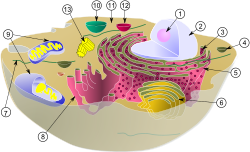Body fluids
The majority of the human body is composed of fluids and predominantly water. The value of the body fluids accounts for the 60-65% of the total body weight averaging between 42 and 46 L in a normal 70kg body. The body fluid component of the human body divides in two major compartments, the intracellular compartment which is the largest and the extracellular compartment which accounts for the half of the intracellular value.
Intracellular compartment
The intracellular compartment measures about 28 L, the 2/3 of the total body weight. The intracellular fluid refers primarily to the fluid that is bound within the cellular plasma membrane called the cytosol. Besides cytosol however, there is also a small amount of fluid inside the cell that is not bound within the plasma membrane but rather by the organelle membrane. For example all the membranous organelles including the nucleus which surrounded by the phospholipid bilayer also contains fluid. Since each membrane bound compartment has different function between one another, the concentration and the composition of the intracellular fluid is also different and heterogeneous even within one cell.



